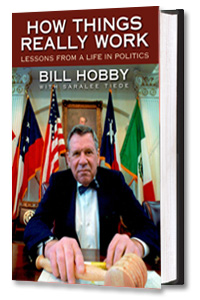Barbara Jordan was the most revered public official I have ever known. She had a presence that permeated the classroom in which she taught the most popular course at the Lyndon B. Johnson School of Public Affairs at the University of Texas in Austin.
That same aura actually hushed the rowdy Democratic National Convention in 1976. Barbara made one of the two keynote speeches that year. Her speech was hardly a partisan call to arms. It was an anthem to the Constitution and a call for a balanced budget. (The other keynoter was Senator John Glenn. Senator Glenn learned the hard way what people in Texas politics had known for a long time: Don’t follow Barbara Jordan on a program.)
At a Congressional dinner in 1978, chaired my then-Majority Leader Jim Wright, Barbara ended the evening’s program by singing, without any musical accompaniment, The Battle Hymn of the Republic. By the time she finished, the audience was standing in silent tribute to her.
In less formal settings, she was a pretty fair hand with a guitar. Her repertoire of folk music was legendary.
Barbara is remembered for her eloquence, and eloquent she was. God gave her a voice that sounded like it was coming from the mountain top. But it was not the voice that made her eloquent. Her eloquence came from her head, not her throat. Barbara did not speak unless she had something to say. When she had something to say, she said it without a wasted word.
Barbara was the conscience of whatever group she was associated with: the Texas Senate, the United States Congress, the LBJ School of Public Affairs, the Ann Richards administration. But she was a conscience with a sense of humor. Several years ago, Barbara was asked to lecture on ethics to employees of the Lower Colorado River Authority. The LCRA had been attacked for some pretty inconsequential stuff: some employees were accused of going on a hunting trip sponsored by a contractor. Barbara’s lecture series was condensed to one fifteen-minute lecture.
“By Texas standards you don’t have a scandal,” Barbara told the assembled and delighted employees. “You’ll just have to try harder.”
Barbara was born 59 years ago in Houston and raised in the Fifth Ward. Her father was a preacher. He lived to see Barbara become president pro tem of the Texas Senate and receive the traditional honor of being “Governor for a day.” He died within hours of seeing his daughter add another footnote to history by becoming the first black woman so honored.
Barbara was “the first black woman who….”
— was elected to the Texas Senate;
— was elected to the United States Congress from a former Confederate state.
— (fill in the blank with almost any political honor that comes to mind).
The acclaim did not come instantaneously or immediately. She ran unsuccessfully for the Legislature twice before she was elected to the Texas Senate in 1966. When she was finally elected she was instantly recognized as a leader.
Barbara first came to national notice as a member of the House Judiciary Committee that considered impeachment charges against President Richard Nixon after the Watergate scandal in 1974. Her scholarship that was the basis of her eloquence brought her instant recognition.
Ironically, that very recognition became part of the reason she did not run for re-election to Congress in 1976. Shelby Hearon, the author with whom Barbara wrote her autobiography published in 1979, reports that Barbara could not walk down the halls of the Capitol without having people trying to snatch clothing or jewelry from her as mementos. She was even harassed in the rest rooms, Hearon reports.
Barbara represented me in the Texas Senate and Congress. I once introduced her to a group as “my Congressperson,” mouthing what I thought was the politically correct jargon of the time. Barbara snapped back, letting me know that she was no Congressperson, but a Congresswoman.
I never used that ridiculous expression again.

